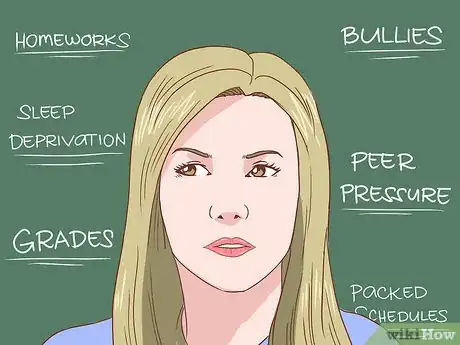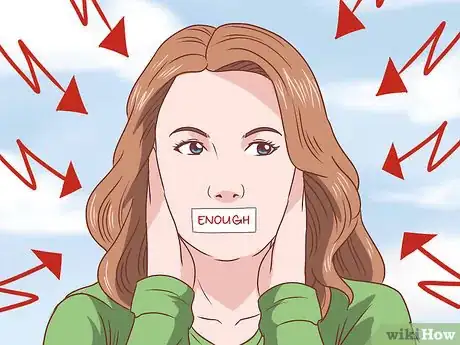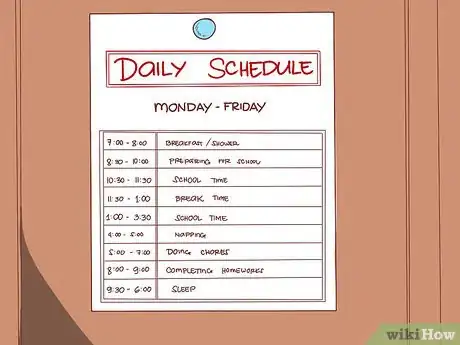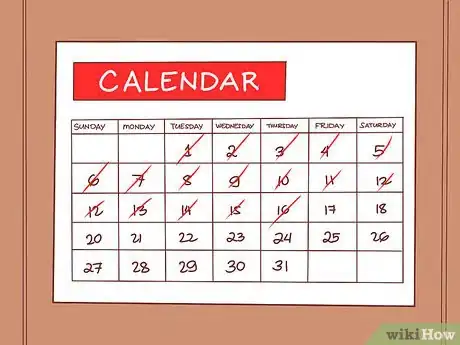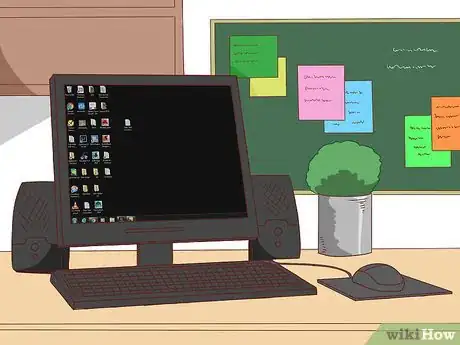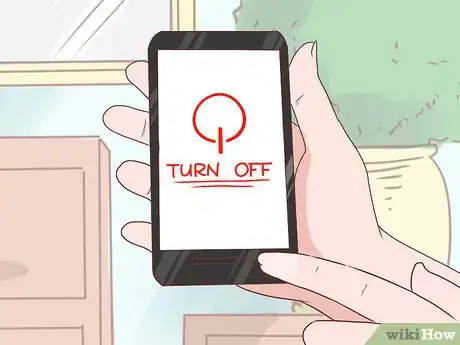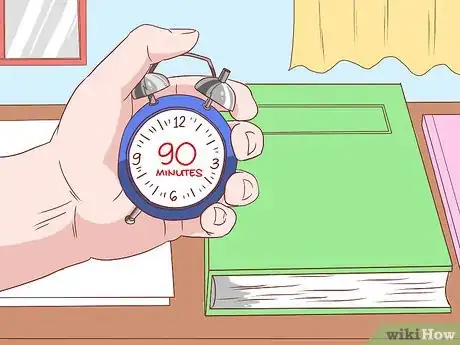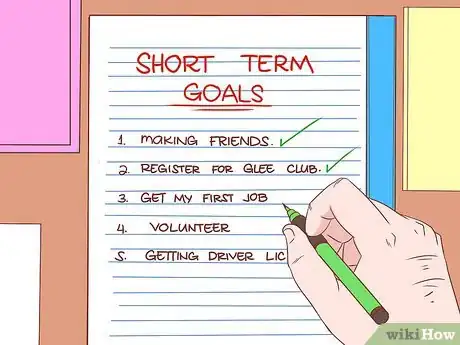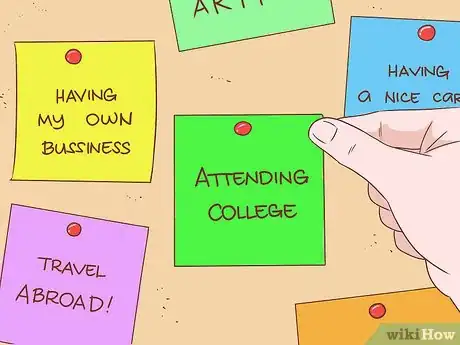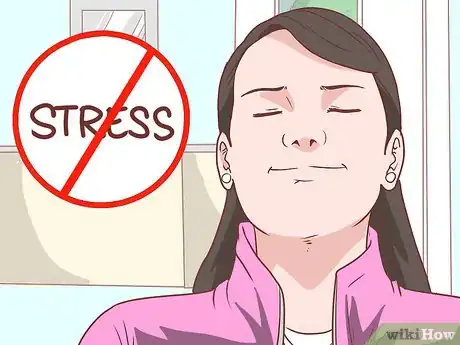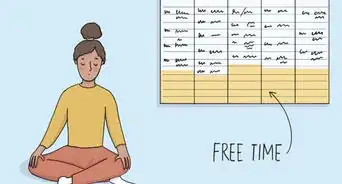This article was co-authored by Trudi Griffin, LPC, MS. Trudi Griffin is a Licensed Professional Counselor in Wisconsin specializing in Addictions and Mental Health. She provides therapy to people who struggle with addictions, mental health, and trauma in community health settings and private practice. She received her MS in Clinical Mental Health Counseling from Marquette University in 2011.
There are 17 references cited in this article, which can be found at the bottom of the page.
This article has been viewed 62,937 times.
Dealing with school stress is something most students have to learn to do during the course of their education. Feeling overwhelmed, out of control, unsure of what you're supposed to be doing or how you're supposed to do it can all result in feeling stressed. To deal with school stress, try to apply new organizational skills. Prioritize what you pay attention to, and develop habits of healthy living that will minimize your stress.
Steps
Handling Stress in the Moment
-
1Get to know the way your body experiences stress. Do your shoulders get tense? Do you start to breathe rapidly, or notice a sour taste in your mouth? If your stomach feels tight, or your palms start to shake or sweat, you're likely feeling stress.[1]
- By learning to recognize the signs of becoming stressed, you can more easily connect the feeling with its source.
- The sooner you start to notice signs of stress or tension, the more rapidly you can take steps to remove yourself from the situation or calm down.
-
2Identify the source of your stress. Is there a certain person, situation, or environment that's causing you to feel stressed out? An important tool in learning to handle your stress is to find out more about what's causing it. Sometimes it will be easy to identify one cause, and other times you might find that your stress is the result of a combination of stressors.[2]
- Common sources of stress at school include homework, grades, sleep deprivation, packed schedules, peer pressure, and bullying.[3] If you are being bullied, talk to your parents, your teachers, or a school counselor to get help.[4]
- Identifying your stressors is the first step in defining your situation as manageable. If you feel like you can find a solution, this in itself should decrease your feelings of stress.
- Try to avoid judging yourself as wrong or bad for feeling stressed. When you locate the source of the stress, keep an objective attitude. Tell yourself, "I'm feeling stressed right now. That's a natural response. I am not my stress."
Advertisement -
3Take 3 deep breaths. Taking deep breaths from the diaphragm triggers the relaxation response in your body, which comes from the parasympathetic nervous system. Taking in air through the nose, breathing all the way down to the belly, and allowing breath to escape slowly through the mouth will help you calm down in a stressful situation.[5]
- It might help to raise, lower and roll your shoulders, or gently turn your neck. Your body often holds these muscles tense when you're feeling stressed. By relaxing these muscles you're also decreasing your feelings of stress.
- Taking deep breaths before entering a stressful situation can help you stay relaxed and focused.
-
4Ask for help. If you don't know how to respond to a stressful situation, find someone to help you. If you're at school, you might ask a teacher, a counselor, or a peer for help. If it's a problem that you need help with right away, talk to someone in your classroom or ask for permission to talk to someone in another part of the building. If it's a long-term problem, consider asking your parent, your teacher, or a counselor for help.[6]
- Everyone has to ask for help at times. Asking for help doesn't mean you're not independent or intelligent. In fact, it's a sign of genuine intelligence to recognize your limitations.
- When you ask for help, include as much information as you can about how you've identified the problem, and things you've tried to make the problem better.
-
5Practice thought-stopping. Sometimes feeling overwhelmed in a stressful situation results in rapid, or "racing", thoughts. If this happens to you, try a strategy called "thought-stopping." This means what it sounds like: interrupt your thoughts, stop, or "park" them out of your immediate attention, and temporarily turn your attention to something else for a while.
- You might try saying (either out loud or to yourself): "That's enough of those thoughts for now. I will get busy (doing something else) and come back to this after lunch."
- This strategy is also known as "adaptive distancing".
-
6Move away from the situation if you can. If you're unable to cope with a particular situation, person, or place, one method of handling it is to leave. Physically removing yourself from a situation provides relief from stress and worry.
- You can take a break by taking a walk outside, going to the bathroom (always an option for taking a private moment), or something else. You might invent a story about forgetting something in your car, which will give you a reason to leave the immediate situation and walk outside.
- Having favorite, safe, places in your school setting will be helpful. For example, if you feel better in quiet spaces, go visit the library when you're feeling stressed.
- There are times when this is not appropriate. For example, you should not leave an exam or presentation in the middle of it. However, you could decide to leave the situation if, for example, you are having a conversation with someone that is stressing you out. Try saying something like, "I'm feeling a little overwhelmed right now. I'm going to take a little break, okay?"
Getting Organized
-
1Make a schedule. A daily schedule should include plenty of time for your daily activities, study time, and even time to plan what you're going to wear. A lot of stress is the result of feeling rushed or hurried. If you aren't a morning person, schedule time every evening to plan ahead what you'll be wearing to school the next day. Set aside time for completing homework assignments every afternoon.[7]
- A schedule can be written down for you to see, or it can be memorized. The benefits of writing a schedule down is that it's more likely to make you feel accountable to holding to it. Also, there's the benefit of being able to "check off" items that are finished.
- You can also use a variety of schedule apps to create structure for your day.
- The reason that using a schedule addresses stress is because it allows you to know what work you're supposed to be doing, and where you're supposed to be doing it. You won't have the stress of making those decisions at the last minute.
-
2Keep a calendar in a visible, central location. A calendar is a great organizing structure for reminding yourself of project deadlines, events that will disrupt your daily schedule (such as doctor appointments or visits from Grandmother). Keeping it in a public place allows for your family to know what you have scheduled.[8]
- If you have a project that will take several days or weeks to complete, use a calendar to divide your larger project into smaller steps.
- Using a calendar for accountability helps prevent the feeling of stress that comes from last-minute cramming for a deadline.
-
3Create an organized workspace. Setting aside a particular work area for yourself will help you feel less stressed. Find a workspace that's free from noisy distractions, where you feel you can focus on your work. Have a supply of visual reminders, markers, and materials you might need while you're studying.[9]
- Remember that your organizational system doesn't have to look like anyone else's. The important thing is that it works for you.
- If you're working on a computer, consider turning off your internet browser, or setting limits on yourself so that you don't end up spending your study time on other online activities.
-
4Turn off your phone. Having your phone nearby when you're studying can prevent you from staying focused on your schoolwork, even if you're not looking at it. If your phone is on, you can get texts or messages from friends - and even if you're not, your attention will be distracted by the possibility that someone might call. Instead, turn your phone off (or put it in "airplane mode") so you can be fully attentive to your studies.[10]
- If you are too distracted by having your phone nearby, consider putting it another room (still turned off).
- This is also true for your other screens, including tablets and computers you're not using for your schoolwork.
-
5Set reasonable times for studying. The most effective length of time to schedule for studying is 40-90 minutes. If you study more than that, your attention will be weaker. If you study less, you won't have sufficient time to focus your attention. Use a timer if you need to to set limits around your study time.[11]
- Take a 10-minute break away from your workspace after every study session.
- During breaks from studying, stand up. Move around. Exercise helps with your concentration when studying.
-
6Turn large assignments into small steps. If you have an assignment that feels overwhelming, break it down into smaller parts that you know how to do. Be specific. Rather than scheduling "work on history test," write, "read pages 112-224, and write 6 study questions on the material."[12]
- If you have a long paper, you might start by writing an outline. Then write 5-8 pages on each topic listed in your outline. Combine these short papers to make your long paper.
- If you're studying for a large test, break down the material into manageable steps. You can study by topic, by chapter, or by subject.
-
7Don't wait until the last minute. If you are the kind of person who waits until the night before a major project is due to get it finished, or reads the whole book the night before a test, you know how stressful that can be. An extra burst of intense studying at the last minute can help you get through exams, but the best studying relies on information learned in the weeks beforehand.[13]
- Use a calendar to schedule study time for a major project 2-4 weeks ahead of time.
- You might need to become a little bit of a hermit for a time, but using a calendar can remind you that you'll be free to socialize after the deadline has passed.
-
8Ask for help. Everyone needs help sometimes. If you can't figure out how to get organized, ask someone to help you. Another person can take a fresh look at your workspace, and see ways to organize that you can't.
- You can always borrow ideas from the way another person has learned to organize her workspace. Look online for ideas, or notice the way your friends organize their own study spaces.
- If hiring a professional organizer is a possibility for you, this might be an effective way to get a new system in place. The difficulty is that, unless you learn how to use this organizational system, you'll bring your old habits into the new space and quickly develop the same habits you always had.
Prioritizing Your Attention
-
1Figure out how you're feeling. If you're the kind of person who doesn't prioritize her own feelings, you might end up feeling overwhelmed and stressed more quickly than someone who notices her stress level inching up. You might need to include checking out your feelings as a part of your daily schedule.
- Try using a "feelings thermometer" to take your emotional temperature. Your thermometer might range from "Piece of cake!" to "Out of control!" or similar. If your temperature is too high, do something relaxing. If it's too low, it would be a good time to try something new.
- If identifying feelings is hard for you, try looking at a "feelings chart"[14] that can help you remember the different emotions, and identify the one that's true for you.
-
2Learn to say no. It's great to be involved in a variety of activities, but if you don't have enough time to do them all, you'll end up stressed. Learning to say no is an important quality of living independently and successfully.[15]
- Remember that saying no isn't always selfish, and saying yes isn't always healthy.
- As you learn to practice saying no, you're also learning to prioritize your own mental well-being.
-
3Figure out what you can put off. If you won't be taking the SAT within the next year, you might be able to put off studying for it. If you have a major project due in one subject, see if you can put off studying for a test that won't occur until next week.[16]
- If you've planned well, you should have scheduled adequate time for both. But don't waste time blaming yourself if you find yourself in a bind. Make the best of it, and prioritize what needs to be done first.
- Remember that not everything has to be done perfectly. If you're taking a class "pass-fail" then you don't have to make a perfect grade in it. Doing something "good enough" is an important life skill for a perfectionist to master!
-
4Try to set attainable short-term goals. It's a lot less stressful to set goals that you can actually accomplish, rather than setting goals that describe the kind of lofty ideals that you might prefer. If your goals are attainable, you'll be encouraged by the feeling of success that comes with completing a goal.[17]
- For example, if you're in a new school, you might feel overwhelmed by how much you don't know about your new setting. An attainable short-term goal might be to learn your way around, and perhaps find one new person to talk to.
- Setting goals that are attainable means that you'll have to know your own strengths and challenges.
-
5Think about your long-term goals. You might make a list of what you'd like your life to contain in the future. If you're in high school, you'll need to start thinking ahead to what you want to do after graduation. If you want to be a veterinarian, for instance, you'll need to think about how to balance your love of animals with your need to study trigonometry in order to get into a good veterinary college program.[18]
- Post images, words, and reminders of your long-term goals near your study space.
- If you aren't sure what your job goals are, that's okay. Instead, think about your priorities and values. For instance, if you know working outside is important to you, explore careers that are based in nature.
- Talking with your parents, a career or guidance counselor, or another trusted person can provide some good support for this process.
-
6Don't let social pressures stress you out. School stress isn't limited to academic pressures. Peer interactions, personality conflicts, subtle bullying and discrimination can all interfere with your ability to learn. To counterbalance the stresses that come from daily pressures, find someone to talk to. You can talk to your parents, trusted friends, a mentor or a professional counselor. Consider telling your teacher about any social issues that she may be able to help with.[19]
- Try using role-playing around the situation, or develop scripts to use that can help you avoid conflicts.
- Learning to stand up for yourself can help you feel less stressed over time.
- Try to use "I" statements to talk about your responses to social pressures. For example, stating that "I feel anxious when you do this, because it makes me feel left out." This provides clear information about your experience while still identifying the problem to another person.
Living a Healthy Life
-
1Get exercise. Research shows that not only is exercise a great stress-reliever, it improves your ability to concentrate and study. Find something that you love to do, and try to set aside part of every day to do it. You might like running, bicycling, walking, dancing, or another exercise. Both aerobic exercise (exercise that makes you breathe more heavily) and anaerobic exercise (like weight-lifting) can help you get rid of stress.[20]
-
2Find ways to blow off steam. If you're stressed, you'll need to find healthy ways to get rid of it. Punch a pillow, or take a deep breath. Take a short run. Your goal should be to recognize when you're stressed, and find ways that you can use to not take out your frustration on other people.
- Pretending that you're not stressed isn't really a successful long-term solution.
- You can literally "blow" off steam by blowing on a pinwheel or a feather. The way this works is to encourage deep breathing and distracting your attention from the thing that's upsetting you.
-
3Schedule relaxing activities. Even when you're feeling stressed, taking time to schedule relaxing activities for even short periods of time will help you avoid getting overwhelmed. Taking short walks, bubble baths, or setting aside time every day for meditation are all ways to include relaxation as a healthy part of your daily schedule.[22]
- Find relaxing activities that don't take very long to do, such as jumping on a trampoline for the length of your favorite song, or spending 10 minutes playing with your dog.
- Remember that doing things that make you feel relaxed and happy are essential part of living a successful life. They shouldn't make you feel guilty.
-
4Make time to laugh. Laughter is consistently shown to be one of the best ways to counteract stress. Taking 30 minutes to watch your favorite sitcom, or reading from a humorous website to relax are great ways to deal with stress. Browse through a joke book, or watch a scene from your favorite comedic movie when you need a break.[23]
- Laughter serves to relieve your stress response, and stimulate relaxation. It even releases pain-relievers within the body.
- Laughter Yoga is a new trend that is becoming popular. Look for videos of laughter yoga online if there's not a class happening near you. Chances are, even watching other people engaged in laughter will cause you to chuckle.
-
5Try singing away your stress. Singing serves to reduce stress by lowering your heart rate and releasing endorphins that help you feel better. Whether you sing in a choir, or only in the shower, singing is a great way to lower your stress.
- Singing loudly maximizes the benefits that come from singing. If you life with other people, you might feel shy about doing this. Possible solutions are to sing when you're alone in the house, or go to the car and sing there.
- Sing along with the radio or with your favorite artist if you're too self-conscious to sing alone.
-
6Get enough sleep. If you're feeling stressed, chances are you're getting less sleep than you need. Most people need at least 8 hours of sleep per night, and some may need more. Some common ways that stress interferes with sleep are racing thoughts as you settle into sleep, and repetitive and persistent thoughts that cause you to feel stressed as you try to get to sleep.[24]
- Avoid strenuous exercise within 2 hours of sleep.
- Try to maintain a regular sleep schedule on weekdays and weekends. Sleeping late on the weekends may seem pleasant, but it interferes with your circadian rhythm.
-
7Eat a healthy diet. A common response to stress is overeating foods that are high in calories, sugar and/or fat. However, poor eating habits result in more stress overall, spending more on foods and overeating, often resulting in weight gain. Maintain a healthy diet by sticking to foods that are high in nutritional content and fiber.
- Instead of chips, try snacking on healthy things like apples, carrot sticks, or raw chopped up vegetables.
- If you crave sugar when you're stressed out, make a smoothie from a banana, some blueberries and some non-fat yogurt. Other fruit combinations will also help satisfy your sweet tooth without resulting in more stress.
-
8Avoid caffeine and alcohol. Both caffeine and alcohol deplete the stress resources of your body and result in a higher level of stress. Caffeine interferes with your ability to get to sleep at night, while alcohol affects the quality of sleep you get.
- Be aware than many products contain caffeine. Tea, coffee, sodas, and energy drinks are all possible sources of caffeine. The Mayo Clinic suggests that you limit yourself to no more than 100mg of caffeine per day (about the amount in a cup of brewed coffee) if you're an adolescent, and no more than 400mg per day if you're an adult.[25]
- Both caffeine and alcohol may be used in moderation in times when you're not stressed. However, in stressful circumstances, these substances have a negative effect on the body.
- Do not use alcohol if you are underage. People who drink underage are more likely to engage in other risky behaviors, including drug use and unsafe sex. They are also more likely to fail out of school.[26] If you are of drinking age, consume it in moderation, which the National Institute on Alcohol Abuse and Alcoholism defines as no more than 1 drink per day for women and no more than 2 drinks per day for men.[27]
Warnings
- If you're feeling overwhelmed by stress, you may need to seek additional help. Talking to a therapist, a parent, a counselor or another trusted person is important.⧼thumbs_response⧽
- Don't do anything because of feeling stressed that you'll regret afterwards.⧼thumbs_response⧽
References
- ↑ https://hbr.org/2014/11/how-to-handle-stress-in-the-moment/
- ↑ http://psychcentral.com/lib/tips-for-better-managing-your-stress/
- ↑ http://www.npr.org/sections/health-shots/2013/12/02/246599742/school-stress-takes-a-toll-on-health-teens-and-parents-say
- ↑ http://www.stopbullying.gov/get-help-now/
- ↑ https://hbr.org/2014/11/how-to-handle-stress-in-the-moment/
- ↑ http://psychcentral.com/lib/tips-for-better-managing-your-stress/
- ↑ http://www.studypoint.com/ed/school-stres/
- ↑ http://www.studypoint.com/ed/school-stres/
- ↑ http://www.studypoint.com/ed/school-stres/
- ↑ http://www4.semo.edu/gjohnson/study%20tips/study_tips.htm
- ↑ http://www4.semo.edu/gjohnson/study%20tips/study_tips.htm
- ↑ http://www4.semo.edu/gjohnson/study%20tips/study_tips.htm
- ↑ http://www4.semo.edu/gjohnson/study%20tips/study_tips.htm
- ↑ http://challengingbehavior.fmhi.usf.edu/do/resources/teaching_tools/toc/folder8/8f_feeling_chart.pdf
- ↑ http://www.mayoclinic.org/healthy-lifestyle/stress-management/in-depth/stress-relief/art-20044494
- ↑ http://www.studypoint.com/ed/school-stres/
- ↑ http://www.studypoint.com/ed/school-stres/
- ↑ http://www.sylvanlearning.com/blog/index.php/10-good-study-habits-new-school-year/
- ↑ http://www.parents.com/kids/problems/bullying/bullying-and-stress/
- ↑ http://www.mayoclinic.org/healthy-lifestyle/stress-management/in-depth/exercise-and-stress/art-20044469
- ↑ http://well.blogs.nytimes.com/2009/11/18/phys-ed-why-exercise-makes-you-less-anxious/?_r=0
- ↑ http://www.studypoint.com/ed/school-stres/
- ↑ http://www.mayoclinic.org/healthy-lifestyle/stress-management/in-depth/stress-relief/art-20044456
- ↑ https://www.uhs.uga.edu/sleep/index.html
- ↑ http://www.mayoclinic.org/healthy-lifestyle/nutrition-and-healthy-eating/in-depth/caffeine/art-20045678
- ↑ http://pubs.niaaa.nih.gov/publications/AA67/AA67.htm
- ↑ http://www.niaaa.nih.gov/alcohol-health/overview-alcohol-consumption/moderate-binge-drinking
About This Article
If school is stressing you out, pause for a second and take 3 deep breaths to calm yourself down. As you breathe in through your nose, feel the air go all the way down to your belly before letting the air escape slowly through your mouth. To avoid stress in the future, make a daily schedule of what you need to accomplish so you don’t end up feeling rushed or hurried. Be sure to schedule time for short breaks in between work, as this will help keep you relaxed and focused. Whatever you do, don’t wait until the last minute to do the bulk of your work, since this will only burn you out. Instead, break large assignments into small steps and schedule them out 2 weeks ahead of your due date. For more advice from our co-author, including how to prioritize tasks, read on!

